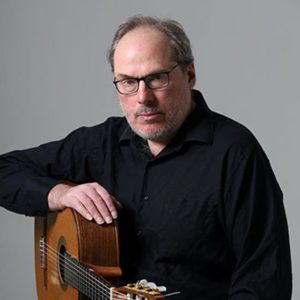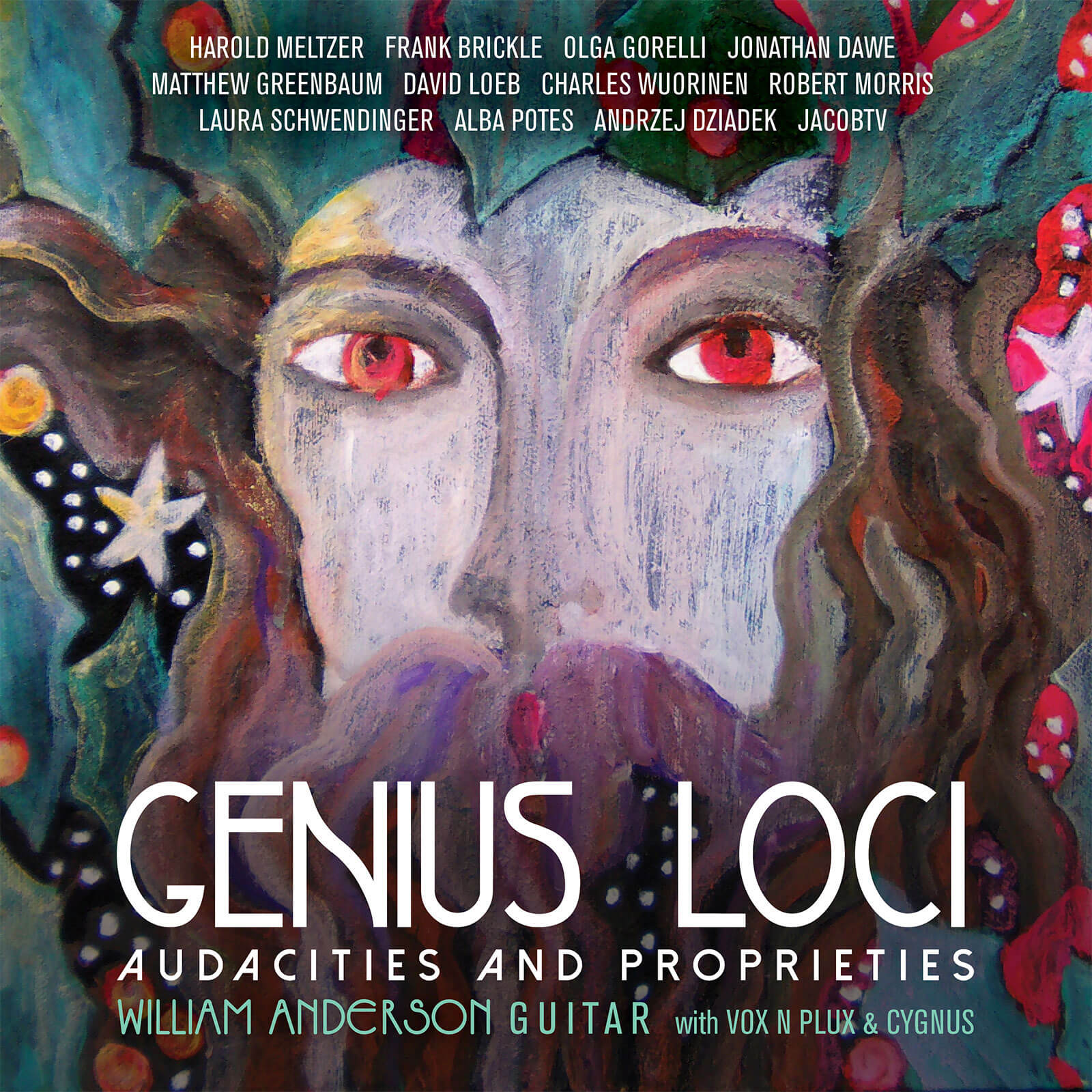Genius Loci
William Anderson guitar
Harold Meltzer composer
Frank Brickle composer
Olga Gorelli composer
Jonathan Dawe composer
Matthew Greenbaum composer
David Loeb composer
Charles Wuorinen composer
Robert Morris composer
Laura Schwendinger composer
Alba Potes composer
Andrzej Dziadek composer
JacobTV composer
Guitarist William Anderson presents GENIUS LOCI, an anthology compilation highlighting his storied career as both a composer and a performer. The album features Anderson’s work with a variety of ensembles as well as his solo guitar music. The New York Times has deemed Anderson “the alert guitarist,” and with good reason; his playing reveals his passionate attention to detail. Anderson was mentored in the musical values of late Modernism, but now seeks compelling music without strictly aligning himself with particular aesthetic ideologies. The resulting anthology from Ravello Records captures the color and breadth of Anderson’s more-than three decades in the music industry.
Listen
Stream/Buy
Choose your platform
Track Listing & Credits
| # | Title | Composer | Performer | |
|---|---|---|---|---|
| 01 | Doria Pamphili | Harold Meltzer | William Anderson, guitar | 3:48 |
| 02 | Genius Loci | Frank Brickle | William Anderson, mandolin; Oren Fader, guitar | 1:27 |
| 03 | Silent Moon | Olga Gorelli | William Anderson, guitar; Marc Wolf, guitar | 1:18 |
| 04 | Braggadocio | Jonathan Dawe | William Anderson, guitar | 5:01 |
| 05 | Doctor Greenbaum's Coranto | Matthew Greenbaum | William Anderson, guitar | 2:44 |
| 06 | Hail Wind: I. Moderato | David Loeb | Sheer Pluck | William Anderson, conductor; Kyle Miller, Murad Samoon, Jonathan Ramirez, Pablo Sanchez, John Coughlin, Ebin Samuel, Austin Tobia, Xavier Paez Haubold - Guitars | 2:36 |
| 07 | Hail Wind: II. Allegro | David Loeb | Sheer Pluck | William Anderson, conductor; Kyle Miller, Murad Samoon, Jonathan Ramirez, Pablo Sanchez, John Coughlin, Ebin Samuel, Austin Tobia, Xavier Paez Haubold - Guitars | 2:40 |
| 08 | Variations on "Long Ago and Far Away": I. | William Anderson | William Anderson, guitar | 2:10 |
| 09 | Variations on "Long Ago and Far Away": II. | William Anderson | William Anderson, guitar | 1:34 |
| 10 | Variations on "Long Ago and Far Away": III. | William Anderson | William Anderson, guitar | 2:07 |
| 11 | Variations on "Long Ago and Far Away": IV. | William Anderson | William Anderson, guitar | 1:22 |
| 12 | Hexadactyl | Charles Wuorinen | William Anderson, guitar | 2:51 |
| 13 | Après vous | Robert Morris | William Anderson, guitar | 10:59 |
| 14 | Footfalls | Laura Schwendinger | Cygnus | James Baker, conductor; Tara Helen O’Connor, flute; James Austin Smith, oboe; Calvin Wiersma, violin; Susannah Chapman, cello; Oren Fader, guitar; William Anderson, mandolin and guitar | 12:40 |
| 15 | Horizontes (Excerpts): No. 2, Cuando las olas con suavidad suspiran [Live] | Alba Potes | Vox n Plux | Elizabeth Farnum, soprano; William Anderson, tiple | 2:04 |
| 16 | Horizontes (Excerpts): No. 3, Calma mi niño [Live] | Alba Potes | Vox n Plux | Elizabeth Farnum, soprano; William Anderson, tiple; Oren Fader, guitar | 3:35 |
| 17 | The Song | Andrzej Dziadek | William Anderson, guitar | 6:00 |
| 18 | Postnuclearwinterscenario | JacobTV | William Anderson, guitar | 7:25 |
Cover art Holly King by Cinzia Bauci
Liner notes edited by Martha Trachtenberg
This album was a project of Marsyas Productions
TRACK 1 — Recorded Fall, 2019 at Dreamflower Studio, Bronxville NY
Producer Marsyas Productions
Recording Session Engineer William Anderson
TRACK 2 — Recorded 2010 at Dreamflower Studio, Bronxville NY
Recording Session Producer & Engineer Jeremy Tressler
TRACK 3 — Recorded 1999 at Dreamflower Studio, Bronxville NY
Producer Marc Wolf and Jeremy Tressler
Recording Session Engineer Jeremy Tressler
TRACK 4 — Recorded Fall, 2019 at Dreamflower Studio, Bronxville NY
Producer Marc Wolf
Recording Session Engineer Jeremy Tressler
TRACK 5 — Recorded Fall, 2019 at Dreamflower Studio, Bronxville NY
Producer Marsyas Productions
Recording Session Engineer William Anderson
TRACKS 6-7 — Recorded April 25, 2019 at the Aaron Copland School of Music
Producer Marsyas Productions
Recording Session Engineer William Anderson
TRACKS 8-11 — Recorded 1999 at Dreamflower Studio, Bronxville NY
Producer Marc Wolf and Jeremy Tressler
Recording Session Engineer Jeremy Tressler
TRACK 12 – Recorded 2008 at Dreamflower Studio, Bronxville NY
Producer Marsyas Productions and Jeremy Tressler
Recording Session Engineer Jeremy Tressler
TRACK 13 – Recorded 2019 at Dreamflower Studio, Bronxville NY
Producer Marsyas Productions and Jeremy Tressler
Recording Session Engineer Jeremy Tressler
TRACK 14 — Recorded March 2019 at University of Wisconsin, Madison WI
Producer Marsyas Productions and University of Wisconsin, Madison, Music Department
Recording Session Engineer Lance Ketterer
TRACKS 15-16 — Produced by Las Américas en Concierto
Recorded live on May 30, 2017 at the Church of St. Luke in the Fields, New York NY
Sound Engineer Scott Friedlander
TRACK 17 — Recorded 2019 at Dreamflower Studio, Bronxville NY
Producer Marsyas Productions and Jeremy Tressler
Recording Session Engineer Jeremy Tressler
TRACK 18 — Recorded 2019 at Dreamflower Studio, Bronxville NY
Producer Marsyas Productions and Jeremy Tressler
Recording Session Engineer Jeremy Tressler
Post-production (tracks 1-14, 17-18) Jeremy Tressler
Executive Producer Bob Lord
Executive A&R Sam Renshaw
A&R Director Brandon MacNeil
A&R Mike Juozokas
VP, Audio Production Jeff LeRoy
Audio Director Lucas Paquette
VP, Design & Marketing Brett Picknell
Art Director Ryan Harrison
Design Edward A. Fleming
Publicity Patrick Niland, Sara Warner
Artist Information

William Anderson
Composer and guitarist William Kentner Anderson began playing chamber music at the Tanglewood Festival at age 19. He later performed with the Metropolitan Opera Chamber Players, Chamber Music Society of Lincoln Center, NY Philharmonic, and many other NYC-based ensembles and organizations. Anderson was recently featured at the Festival Internacional Camarata 21 in Xalapa, Vera Cruz, Mexico, Ebb & Flow Arts in Maui, and Moderne Mandag in Copenhagen and was a member of the Theater Chamber Players, the resident ensemble at the Kennedy Center in Washington DC.
Notes
II
Cuando las olas con suavidad suspiran
cuando los rayos del sol mueren;
cuando las sombras de la noche caen
Campanas de las tarde llaman,
Margarita! Margarita!
pienso en ti!
pienso en ti!
II
When the waves softly sigh,
When the sunbeams die,
When the night shadows fall,
Evening bells call,
Margarita! Margarita!
I think of thee!
I think of thee!
— Charles Ives, translation by Alba Potes
III
Calma mi niño, duérmete
tú y yo cantaremos suavemente
que nada enturbie tu sueño
Lento el verano se está yendo
los vientos del otoño cantan
que nada enturbie tu sueño
los brillos de los sauces tiemblan
fluye el río en calma y así
fluirá el amor siempre.
III
Hush thee, dear child, to slumbers
We will sing softest numbers
Naught thy sleeping encumbers
Summer is slowly dying
Autumnal winds are sighing
faded leaflets are flying
Brightly the willows quiver
Peacefully flows the river
So shall love flow forever.
— Augusta Ives, translation by Alba Potes
“The alert guitarist.” – Paul Griffiths, New York Times
I try to be on the alert for compelling musical premises, beautifully executed. After over three decades of working with composers in the trenches, I find myself alert to the bigger picture; I see musical problems relating to bigger problems—industrialization and its stultifying business models.
My fingers on the guitar feel for the essence of each composer, like taking in the lines of an interesting or beautiful face. My fingers discover the surprising and brilliant ways the composers first make things work and then work up to something extraordinary. They do things differently than I would. They do things I would not do. My fingers explore, discover, and celebrate the “not me.”
While I was born and mentored into late and ripe modernism, I can hardly be called a modernist. Is there a name for the music here? Without a name, nothing can be replicated ad nauseam to serve a business model. Lacking a name helps keep the composers sane. It’s only bad for marketing. I’m on the alert for a more sustainable creative environment that resists the tyrannies of business models.
To quote Wendell Berry from Life Is a Miracle: Industrial business models “aspire to big answers that will make headlines, money, and promotions…for answers that are uniform and universal—the same styles, explanations, routines, tools, methods, models, beliefs, amusements, etc., for everybody everywhere.” Musical entrenchment and other discontents relate directly to the problems of propriety and sustainability that Wendell Berry brings to our attention.
20th-Century composers developed an unwholesome appetite for revolutions. For example, after some resistance, I came to have great respect for the minimalist pioneers. Their revolution was necessary and laudable, but it became industrialized. Revolutions can become a cult of the large. They can stoke our appetite for grandiosity, creating a dynamic in which, if you don’t create a revolution, you’re irrelevant. Doesn’t the moment call for another orientation no less ambitious—Haydnesque craftsmanship?
I have assembled 12 composers here, establishing a force for the small, joining Wendell Berry and his Locovores. We’re with John Dewey and his Pragmatists, who, over 100 years ago, called for creative forces to serve a specific moment, then disappear.
There is a time and place for everything, including revolution. What is a century of musical revolutions without integration?
This collection makes me absolutely joyous. It honors a great diversity of musical assets that had previously been sequestered into revolutionary camps. I am inviting you to join me in the release of those assets for purposes beyond revolution. Music is a response to our desires. It can keep us whole.
I am a guitarist/composer working with a group of ambitious, hard-working composers. We are pushing and pulling one another in various ways that further creativity. We are at peace with our considerable diversity of creative frameworks, even when those can be at odds with one another. We’re on the move. We don’t stay in one place.
We want for nothing now, except you.
— William Anderson, April 7, 2021
Videos
William Anderson at the Brno Guitar Festival, Czech Republic, August, 2011 – Bragadoccio

